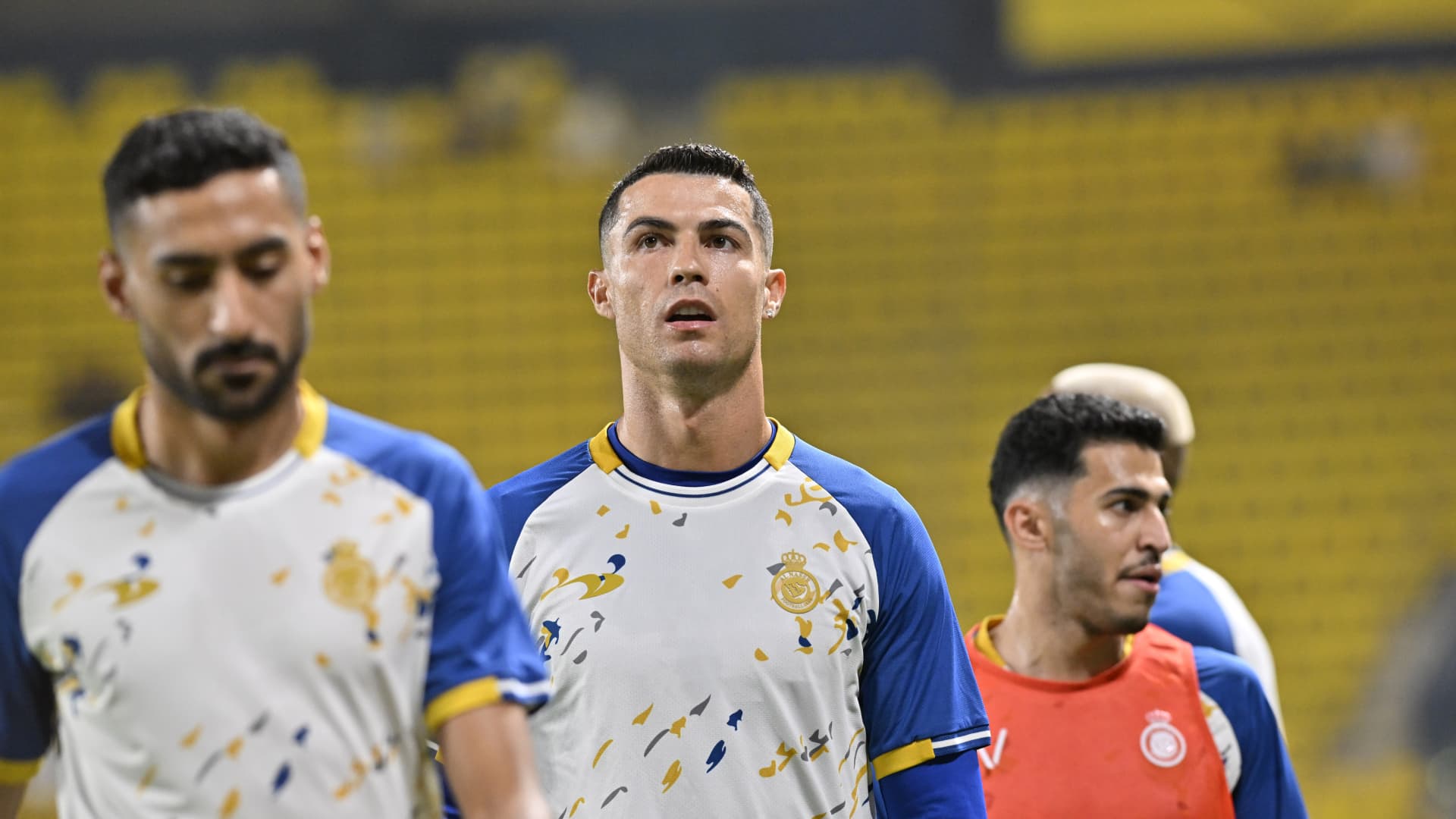Cristiano Ronaldo takes center stage before the Saudi Pro League match between Al-Nassr and Al-Shabab in Riyadh, Saudi Arabia on May 23, 2023. (Photo: Mohammed Saad | Anadolu Agency | Getty Images)
Saudi Arabia’s recent signings of high-profile soccer players have raised questions about the motives and implications of their spending power. In 2023 alone, Cristiano Ronaldo joined the Middle Eastern nation on a free transfer, while Karim Benzema left Real Madrid to join him. Reports suggest that several Chelsea players, including Sergio Ramos, Bernardo Silva, and Heung-Min Son, may also consider offers from the Saudi Pro League. Sky Sports News chief reporter Kaveh Solhekol analyzes this trend in the transfer market and sheds light on the reasons behind Saudi Arabia’s sudden spending spree.
Saudi Arabia’s motivation behind these extravagant signings lies in its efforts to diversify its economy and secure its financial future. As a country heavily reliant on oil sales, Saudi Arabia acknowledges the need to explore alternative industries. One sector they are focusing on is sports, particularly soccer, aiming to develop their own leisure and entertainment industry and capitalize on the immense interest in football among the Saudi Arabian population, 70% of which is under 40 years old. The country views soccer as a means to boost tourism and raise its international profile.
The Saudi Arabian rulers have recognized the commercial potential of their country’s love for sports and want to retain the monetary benefits within their borders rather than allow external entities to profit from it. By taking control of sports-related ventures, they seek to enrich their own economy and establish Saudi Arabia as a prominent player on the world stage.
However, Saudi Arabia’s ambitious endeavors in sports have not escaped criticism. Amnesty International and Human Rights Watch accuse the country of using sports events to deflect attention from its human rights violations. While some reforms have been announced, ongoing repression and disregard for basic rights hinder progress. The United Nations investigation into journalist Jamal Khashoggi’s murder implicated the Saudi Arabian state, adding to concerns about the country’s ethics.
Nevertheless, Saudi Arabia’s soccer investments also offer opportunities for soft power projection and influence. Their potential bid to host the 2030 World Cup alongside Greece and Egypt demonstrates their intention to strengthen their global reputation through sports.
Drawing parallels with China’s Super League in 2004, it becomes evident that Saudi Arabia’s soccer ambitions are long-term. However, the Saudi Arabian clubs have more financial resources at their disposal and appear more committed to their cause. This suggests that their influence on the transfer market will persist and grow over time. Sky Sports News predicts that within the next five years, Saudi Arabia aims to attract 100 top foreign players to their league, with an increasing number already expressing interest, such as Ruben Neves and potentially Erling Haaland and Harry Kane.
Saudi Arabia’s extravagant spending has already disrupted the transfer market, with every notable transfer now prompting mentions of interest from Saudi clubs. While some players in their prime will decline offers, the lure of financial gain has persuaded others, as seen with Ruben Neves’ move to Al Hilal. Clubs around the world now face stiff competition from the lucrative Saudi Arabian market.
Concerns have also arisen regarding Chelsea’s involvement with Saudi Arabia and whether it serves as a means to circumvent their Financial Fair Play obligations. After spending £600 million, Chelsea needs to balance their books and offload players. The sudden interest from Saudi clubs offering substantial sums for Chelsea players appears suspicious to some. Speculation has also arisen due to the Saudi Public Investment Fund’s investment in Clearlake Capital, a private equity fund with majority stakes in Chelsea. However, according to insider information, the Saudi Arabian sovereign wealth fund has numerous investments worldwide, with Clearlake holding ownership in 400 different companies. Chelsea denies any conflict of interest.
In conclusion, Saudi Arabia’s entry into the world of soccer has sparked intrigue and debate. Their motivations lie in diversifying their economy, promoting their country’s soft power, and capitalizing on the passion for sports among their population. While concerns about human rights records and accusations of sportswashing persist, their financial resources and long-term vision indicate that their impact on the transfer market will endure. The involvement of Saudi Arabian clubs has disrupted the status quo and posed a viable alternative for players seeking lucrative deals. Only time will tell how this trend will unfold and shape the future of global soccer.
Denial of responsibility! VigourTimes is an automatic aggregator of Global media. In each content, the hyperlink to the primary source is specified. All trademarks belong to their rightful owners, and all materials to their authors. For any complaint, please reach us at – [email protected]. We will take necessary action within 24 hours.


